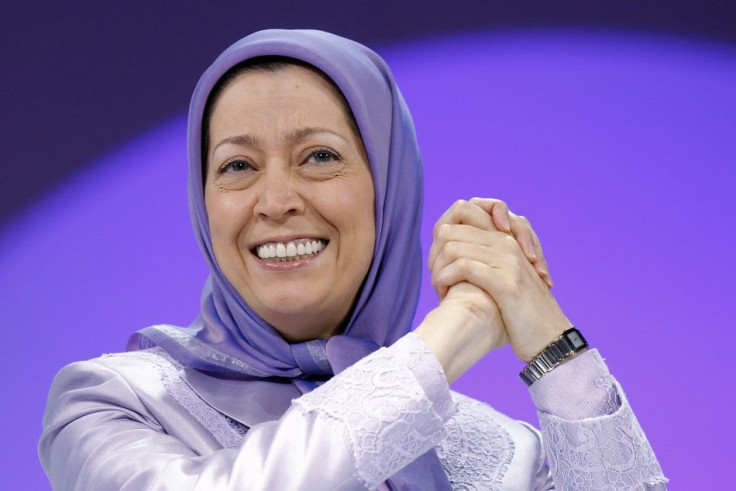Obama Administration Wants Iran Exile Group MEK Off Terrorist List: Report

The Obama Administration is trying to get Iranian exile group the People's Mujahedin of Iran taken off the State Department's list of Foreign Terrorist Organizations, according to a Monday report in the Wall Street Journal.
The Mujahedin -- sometimes called the Mujahedin-e Khalq or MEK -- has been on the terrorist list for 15 years, and the designation makes supporting, funding or accepting payment from MEK illegal. The group has been vigorously petitioning the State Department to take it off the list for the past two years, which, given that nuclear talks with Iran are under way, would have serious political overtones.
There is a great deal of animosity among Iranian officialdom toward the MEK. But our de-listing has to be done by the facts and the law, a senior U.S. official told the Journal. Any move to de-list should not be seen as a sign of our support.
Once a paramilitary organization, the MEK -- whose members are currently being moved from Camp Ashraf, the refugee city in Iraq where the organization has been based since 1986, to Camp Liberty -- is now one of five exile groups under the umbrella of Miriam Rajavi's National Council of Resistance of Iran, or NCRI.
Here is an organization that opposes the autocratic regime and calls for a secular Iran. Yet we do nothing to use them, said Rachel Ehrenfeld, the Director of the conservative American Center for Democracy, in an earlier interview.
It's incredible that they are still around, and we should use everyone who can undermine the regime.
De-listing would not be unprecedented: The European Union did it in 2009, and France dropped criminal charges against Rajavi and 160 other members who were arrested with $8 million outside of Paris in cash by counter-terrorism police in 2003.
In recent months, as the question of Iran's nuclear capabilities shot to the top of the international political agenda, the State Department used the Camp Ashraf move to try to appease MEK and NCRI's vocal supporters, implying, but not outright saying, that a successful transfer could lead to delisting.
Under Saddam Hussein, Camp Ashraf was used as a launching point for attacks against Iran, but since the U.S. invasion of Iraq in 2003, MEK has disarmed and shifted from being a rebel force to a being political refugees.
Secretary of State Hillary Clinton has previously promised to review MEK's status -- which is something that NCRI's lawyers had already filed suit to try to force her office to do -- after the move was complete, and officials now say that she will make a final decision within 60 days of the close of Ashraf.
The MEK's cooperation in the successful and peaceful closure of Camp Ashraf ... will be a key factor in her decision regarding the MEK's [foreign-terrorist organization] status, State Department spokeswoman Victoria Nuland stated on Monday.
The MEK was put on the terrorist list in 1997 due to its attacks against Americans in Iran in the 1970s. MEK supporters suggest this was a failed political move by President Bill Clinton's administration to soften relations with Tehran. Regardless, the organization has disavowed terrorism and claims to be a peaceful and democratic resistance movement, and maybe more importantly, MEK shares a distrust of the current Iranian regime with the United States. MEK is also equally invested in stopping any potential nuclear program in Iran.
However, on Tuesday, the Atlantic Wire pointed out, in a post titled Apparently Terrorism Isn't Terrorism If It Targets Iran, that U.S. officials have fingered MEK as the unnamed assassins behind five fatal car bombings of nuclear scientists in Iran since 2007.
Two officials told NBC News in February that Israel's Mossad spy agency had trained MEK operatives to carry out the attacks, and the New Yorker reported in April that the U.S. Joint Special Operations Command has been training MEK members in the Nevada desert since 2005.
The Foreign Terrorism Organization list really doesn't mean much if the way to get off it is by killing Iranian scientists at the behest of the U.S. and Israel, commented Marcy Wheeler, author of the Emptywheel politics blog.
Still, NCRI appears to be trying to prove its worth to the United States in the lead-up to the State Department MEK review. As it has in the past, the National Council of Resistance just issued a report this month on Iran's nuclear program, claiming that Tehran has expanded the organization responsible for nuclear weapons development in a complete and elaborate and highly ... secret way.
Although the report gives new details into Iran's nuclear program -- for example, the NCRI says it has identified 60 scientists involved in bomb-relevant research -- some question its accuracy.
We have to be extremely skeptical of whatever [the NRCI] says, David Albright, the head of the Institute for Science and International Security think-tank, told Reuters. [They are] an activist group with a huge incentive to say there is a nuclear weapons program that is making great progress.
© Copyright IBTimes 2024. All rights reserved.





















